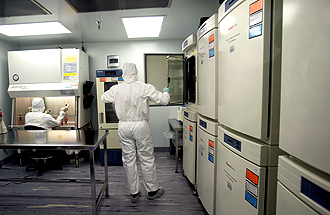Steps Forward in Regenerative Medicine
Tulane University has announced a cooperative agreement with Repair Technologies, a Palo Alto, Calif., biotechnology company, to develop and manufacture adult stem cells from bone marrow.

The preparation of adult stem cells for research is under way at the Tulane Center for Gene Therapy. (Photo by Rick Olivier)
Adult stem cells derived from bone marrow avoid the ethical debate that surrounds embryonic stem cells and may be the future of regenerative medicine. Tulane is recognized as a leader in the production of adult stem cells for research use.
The work will be done at the Tulane Good Manufacturing Practices laboratory located at 1440 Canal St. on the downtown health sciences campus. The facility, developed in partnership with the Louisiana Gene Therapy Research Consortium, was designed to meet the requirements for manufacturing cell therapeutics used in humans. It has been built and operated with funds primarily provided by the state through the Louisiana Board of Regents.
"This is a very exciting collaboration: the first time the Tulane Good Manufacturing Practices Laboratory is working with a biotech company to develop exciting new clinical therapies," said Brian Butcher, research professor of medicine and associate director of the Tulane Center for Gene Therapy.
This agreement demonstrates industry's confidence in the facility and validates the state's continued support for academic research leading to commercial opportunities, according to Steve Moye, president and CEO of the Louisiana Gene Therapy Research Consortium.
"Repair Technologies is excited to be working with Tulane to bring the promise of stem cell therapy to the clinic," says Dr. Annemarie Moseley, president and CEO of Repair Technologies of Palo Alto, Calif.
In 2003 Tulane received a grant from the National Institutes of Health to establish the first laboratory for the preparation and distribution of bone marrow stem cells to academic scientists at other research centers in the U.S. and abroad.
